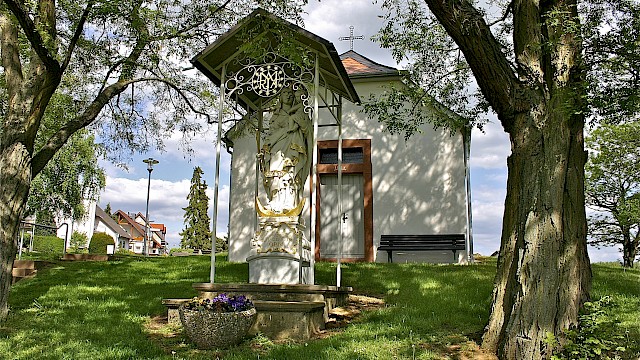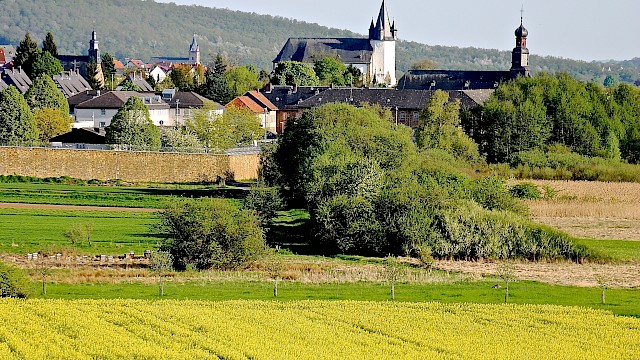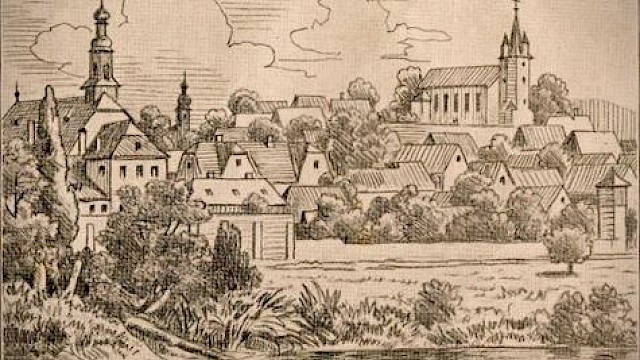After he has gone, they live in the big Krämer house with ponies and
servants. (See Whose Gesangverein? ~ the Story of Katharina & Jakob Sulzbach, Part the Second; See Sulzbach Pedigree Chart). Jakob dutifully writes his wife and children and sends money. Katharina dutifully replies, "Augustin is learning his catechism,
Maria Regina is learning her letters."
Rockenberg
When they walk through town, everyone asks about him. "What is your
grand husband doing in America? In New York, is he?"
"So talented, your father. A genius. Surely he has founded the
greatest Gesangverein of them all, in America!" The little ones giggle,
and the older ones smile at the compliments, and nod, but say nothing.
At home, the Krämers are silent on the matter, but Barbara overhears her uncle's wife complaining about the measly amount Jakob sends, and Georg asks his siblings who the cowardly deadbeat is that their uncles
argue over.
Katharina is not silent. She daily tells Barbara and Maria Regina they must find good husbands who will take care of them, insists to Augustin and Georg they must work hard so they can earn money.
Jacob and Adam warrant individual admonitions. "You may be named for
your father, but you are nothing like him, Jacob. A sharp mind, you
have. You will make your way in the world."
"Adam, get your nose out of those books. You will never be able to
support a wife."
They lurch along like this for several years. Katharina is mostly
silent on the subject of Jakob, so the children must turn to their Sulzbach
relatives to answer their questions. Barbara sings in
the Frauenchor, the women's section of their father's Gesangverein.
Named the Concordia, it is growing in size and beginning to perform in other
towns. Katharina does not attend the concerts. The other
children stay away.
Jakob writes glowing letters about America. He is a missionary of God,
teaching music and religion to German emigrants. The Church's
missionary arm has connected him with a parish in New York, St. Fidelis, in
a village named College Point, where the people need to receive the
Sacraments and benefit from the Holy Father's teachings. The
Church is only 15 years old, small and wooden, unfathomably new compared to
Europe's 1000-year religious history, but its priest is young and
exuberant. An immigrant himself, he conducts everything in
German.
Poppenhusen Institute
College Point itself is small like Rockenberg, but without the farms and
fields. It is a community of music, learning, and culture due to the
Institute begun by its benefactor, Conrad Poppenhusen. College
Point has industries, but Poppenhusen has recognized the need to educate and
uplift the factory workers. He has even begun education for
young children with the fanciful name of children's garden -
kindergarten. It is a perfect fit for Jakob --- ministering to people
far from their homeland through music --- he is living out his calling.
Katharina ensures the children write their father once a month. She
sits with the younger ones, helping Adam spell, giving Georg suggestions on
what to say, painstakingly teaching Maria to form curlicue letters without
splotching the ink everywhere. On the day Maria is able to address the
envelope legibly, Katharina smiles. "You are a big girl now!
Here, put your letter with the others so Vati can see that you wrote it
yourself."
"Where is your letter, Mutti?"
"I don't need to write your father anymore." Katharina's smile grows
wider. "I've taught you. Now you can do it on your own."
She turns and walks away.
Jacob and Georg request descriptions of America's marvels - trains running
on tracks in the middle of city streets, steamboats, exceedingly tall
buildings. A bridge is being built to connect the cities of Brooklyn
and Manhattan - when it is finished, it will be the longest in the world.
Jakob always ends his letters by saying how much he misses them and how he
longs for the day when God will see fit to bring them together again.
He never says how this might be accomplished, and one by one, the children
each come to the conclusion, whether matter-of-factly or in despair, that
this will never happen. In a particularly illuminating moment,
Georg asks his mother when she thinks they will be traveling to America to
join Jakob, and receives a slap in the face as his answer.
Plenty of other families are leaving for America for good. Sometimes
the whole family goes together; sometimes the father or adult children go
first and the rest follow after a year or two. Jacob, ever the
budgeter, begins to wonder about the finances of all this.
At 15, Jacob broaches the subject to his siblings. "Do you think we
will ever join Vati in America?"
"I know Mutti won't go," declares Georg, 12, glumly. "And she probably
won't let any of us."
"She'll have to if we're old enough," posits Augustin, 17.
"How could we ever leave Mutti alone?" offers Adam, 10.
Jacob brings up money again. "How much do you think passage to America
costs?" No one knows.
"And how long will it take Vati to come up with the money?" Barbara,
21, asks. "How can he save up if he has to send us money to live?"
"But everyone in America is rich!" exclaims Maria, 8.
Georg says what everyone is thinking. "If he's so rich, how come
Vati hasn't sent us the money yet?"
Jacob gets back to the math. "Whatever money he earns, minus the
money he needs to live on..."
"Minus the money he sends us," adds Augustin, "leaves what he can save."
"Jacob," Barbara instructs, "Mutti trusts you with the money. You can
ask her how much Vati sends. I will ask someone I know how much a
passage costs."
"Then we just need to know how much Vati earns. And spends," declares
Augustin.
"And how will we ever find that out?" Adam ends the conversation in a
discouraging tone.
A few months later they regroup. Augustin has asked about their
father's salary and the price of a boarding-house room under the guise of a
young man looking at his future. When the siblings ask, he just shakes
his head and hands over the letter.
"My salary is $375 a year. I know it's not much, but the churches here
don't have as much money as they do at home. Most of the parishioners
have little, although we are getting more and more congregants. We have to
rely on subsidies from Rome. And we're saving every penny to build a
real brick building.
To answer your question about living expenses, the boarding house costs $4 a
week. Frau Zoeller is a fine cook and keeps a beautiful table.
Her husband believes in educating the young almost as much as I do. We
have rousing discussions! And you would like this, Augustin -- they
have six beautiful daughters!"
"He sounds like he's having a wonderful time," mutters Barbara
darkly. "While Mutti struggles to keep us in clothes that fit."
"And cries in her room," Maria adds.
"How much does he send, Jacob?" Adam changes the subject.
"Well, to figure out what it is in American dollars, I calculated..."
"Never mind," Georg interrupts. "What is it?"
"Almost everything. He has pfennige, pennies, left for himself."
There is silence as each one imagines a life with a trail of pennies
instead of streets paved with gold.
"So there's no money saved for passages," muses Barbara, "and no way to get
it."
"Unless we earn it ourselves," Augustin decides.
The discovery marks a turning point in which each child, consciously or not,
decides to make their own future rather than depend on their parents.
Jacob and Augustin regard their jobs for local employers as more of a
stepping-stone to their future, and Barbara finds suitable
employment with an eye to taking care of herself if need be. Jacob
starts a little business delivering dry goods to the elderly and the others
join in. They learn that the fancy goods, ribbons and lace, are the
most popular among women and load up on those. Georg determines the
most efficient routes while Barbara creates pretty boxes for delivery
that they can charge more for. Augustin scouts Rockenberg and
Oppershofen for more clients while Jacob calculates profit margins.
The business succeeds and people take notice.
Meanwhile, discrimination against Catholics has not lessened in Bismarck's
Germany. In fact, it has gotten worse. Not only have all the
Catholic schools remained closed, but the state even wants to control
training for the priesthood, as Adam discovers when he applies.
Conflict between church and state leads to arrests. Then the news
breaks that Bismarck wants to institute a military draft. Who knows
what war he may want to start now?
Jacob makes a decision. He approaches his Krämer uncles. "My
father writes about his town in America. College Point is growing in
population and has industries, rubber and silk dyeing factories. My
father isn't making much money there, but I think I could."
The Krämers exchange glances. Their brother-in-law is still much
admired in Rockenberg, and his Gesangverein, the Concordia, is very
successful, if not profitable. "That is not where his talent lies,"
they say diplomatically. "What is your idea?"
"If you would pay my passage to America and give me money to start my own
business, I know I could make a success of it. I wouldn't have very
many expenses; I could live with my father."
"What kind of business?"
"I don't know. I would get there and see what the prospects are first,
then decide."
The uncles grill him some more and then laugh. "You gave smart,
thoughtful answers. But we were going to give you the money
anyway. Look at what you have started here with your delivery
company! You have ambition, brains, and the self-discipline to work
hard. We are certain of our investment."
Jacob writes to his father and waits for the reply. Ten weeks later,
he boards a train for Le Havre, France, the closest seaport. It is
early summer and the stiff breeze off the ocean is chilly as he heads up the
gangplank of the Labrador.
"Age?" the ship's officer asks.
"19."
"Occupation?"
Jacob holds the older man's gaze firmly.
"Merchant," he says.
*Names, dates, and places are accurate. Everything else is a figment of my imagination.
The following is true:
Jakob lives out his life in College Point, a musical instructor at St. Fidelis, with his son Jacob. Katharina dies at age 61 in Alzey, Worms, Hesse, Germany. She never comes to America, and he never returns to Germany.
Jacob becomes a successful silk dyeing factory owner in College Point, marries a daughter of the Zoeller boarding-housekeepers, and raises a family.
Barbara marries a Lutheran man at age 24 and dies in Frankfurt at age 57, a Catholic.
Augustin marries twice and dies in Frankfurt at age 48, leaving a 9-year-old son orphaned with his newly-wedded stepmother.
Georg owns patents with Jacob on various machinery. He becomes a salesman in Leipzig. Family legend says he married Adam’s housekeeper.
Adam becomes a priest and an author, scholar, and/or high ranking clergy member.
Maria marries a 50-year-old man, the widowed husband of her Sulzbach aunt, at age 17. They have 8 children, only 3 of whom survive infancy. One son becomes a doctor in Wiesbaden. A teenager looking for a father figure? She was almost 3 when Jakob left. Or she followed too well her mother’s instructions to find a man to take care of her.
Jacob keeps in touch with Maria, Adam, and Georg the rest of their lives, so I would assume he does with Augustin and Barbara as well.
The Gesangverein, Concordia Rockenberg 1853, is still performing around Europe today.
The teachers in Theodore Zoeller's public schools in Manhattan earned anywhere from $150 for a Class C primary teacher to $1500 for a grammar school principal in 1861. I gave Jakob an average of that.
In 1869, a pamphlet advertised boarding house rents as anywhere from $2.50 to $40 per week. Outside Manhattan, prices would be cheaper and a single man would not have as many needs. So again, I estimated.






Comments
Post a Comment